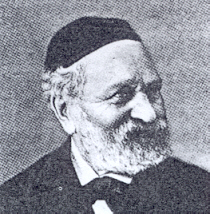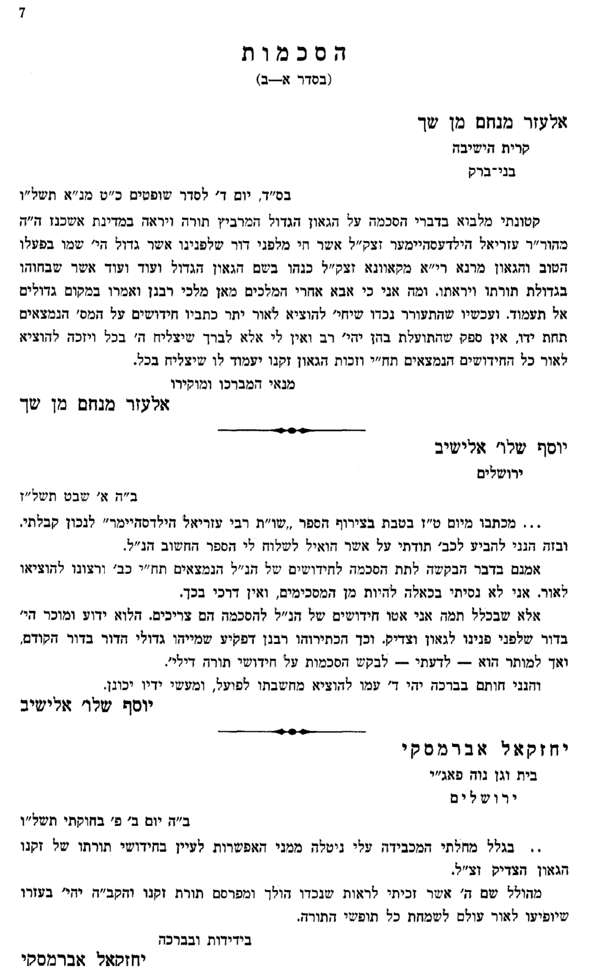
I am not of sufficient stature to provide a letter of approbation for the great Gaon, disseminator of Torah and fearer of the Lord in Germany, our master, Rabbi Azriel Hildesheimer, of blessed memory. He lived in the generation that preceded the previous generation; great was his fame due to his good deeds. The Gaon R. Yitzhak Elhanan of Kovno referred to him as "the great Gaon;" many others praised him for his greatness in Torah and for his fear of God. Who am I to follow in the footsteps of kings? (Who are "the kings"? The rabbis.) Moreover, it is stated in Scripture: Do not stand in the place of nobles (Proverbs 25:6). Now that his grandson has undertaken to publish his (i.e., R. Hildesheimer's) novellae on various tractates of the Talmud, we wish him every success.... May the merit of his grandfather, the Gaon, assure him every success in every matter.
R. Eleazar Menahem Shach
(Haskama to 'Hiddushei Rabbi Azriel: Yevamos, Kesubos', Jerusalem 1984)

R. Azriel Hildesheimer was a contemporary of R. Samson Raphael Hirsch. Unlike R. Hirsch, the Aruch Laner and other university-educated German rabbanim of the 19th century, R. Hildesheimer actually received a university degree (supposedly the first Orthodox rabbi to receive a doctorate is R. Nathan Adler who was Chief Rabbi of Great Britain). He was also a fellow traveler in the Torah im derekh eretz school.
He was a great educator, founding the famous Hildesheimer Rabbinical Seminary in Berlin; a rabbi factory, as it was derisively called by opponents of modernity.
Rabbi Marcus Lehmann -- who was the rabbi of Mainz, editor of Israelit and author of all those children's books; Akiva, Family y Aguilar et cetera -- was an early disciple of R. Hildesheimer. R. Lehmann preserved for us what the daily schedule was when being taught by R. Azriel:
Each morning R. Azriel lectured on poskim from 4 to 6 A.M. From 8 to 10 A.M. he lectured on tractate Gittin, and from 10 A.M. to noon he read German literature with [us]. From 2 to 4 P.M. he lectured on tractate Chullin, and from 8 to 10 P.M. he lectured again on posekim. On Sabbath we prayed at an early service, and then studied tractate Shabbat from 8 A.M. to 12:30 P.M. Friday evenings during the winter season he lectured on tractate Shavuot.
Esther Hildesheimer Cavalry remembered
On Yom Tov, between mincha and maariv, when no zemiros were sung, Father would seat himself in the large armchair in the bedroom, we children around him. I remember sitting at his feet on the footstool, with my brothers Levi and Aharon standing beside him, and Mother and the little ones on the sofa. Then Father would sing to us German "Lieder". And each time for us, his children, the high point was when he sang his favorite, Heine's "Die Zwei Grenadiere".
When R. Azriel died in 1899 his aron was brought into the synagogue because his successor, R. David Zevi Hoffman ruled that even though R. Avraham Danzig had ruled that doing that was only permissible for the Vilna Gaon, since he was unique in his generation, the same applied to R. Azriel who was unique in his generation and was
endowed with every good quality; sanctity, holiness, sharpness of mind, and erudition. He studied Torah day and night; sought diligently to observe the commandments and to do good deeds; strove mightily to work on behalf of the poor in the land of Israel and elsewhere; and fought bravely on behalf of our faith against its detractors...
He happened to have been of means and distributed his salary to the poor. In short, he was great. R. Shach well knew this. Did he know what precisely constituted his study and philosophy, his enjoyment of and singing secular German songs? I am guessing that he didn't know specifically but even if he did it would not have changed his opinion. R. Shach was a young boy when R. Azriel died and doubtlessly knew of his great name growing up. I am not certain however that he would have known every detail about how these great German rabbis lived, what they actually studied and incorporated into their lives etc. That said, it seems that the fact that a R. Shach could have this view of such a great man is revealing. What does it reveal? That not everything is black and white. Yet from reading other writings of R. Shach one would think that some of the things R. Azriel was "guilty of" would be yeharog ve-al ya'avor. Not everything is black and white; even the most black and white people aren't black and white.

No comments:
Post a Comment